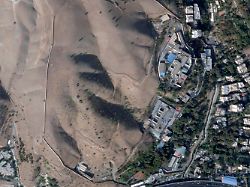Continue under house arrest
Five US citizens released from prison in Iran
8/10/2023 8:53 p.m
Iran regularly detains foreigners on charges of espionage. Many of them are in the notorious Evin prison. Five Americans are now moving from there to house arrest in Tehran – an important development for the future, which has its price.
Iran has released five detained Americans from a prison in Tehran and placed them under house arrest. This was confirmed by the US government’s National Security Council in Washington. Earlier, a lawyer representing the family of a detainee publicized the releases. The US government spoke of an “encouraging step”. However, more difficult negotiations were ahead to bring the five back home.
In exchange for the release, the Islamic Republic is to demand frozen Iranian assets. As the Tasnim news agency reported, it is around six billion US dollars (5.46 billion euros) that South Korea had blocked due to international sanctions. According to Tasnim, the money should first be transferred to Qatar. The Gulf Emirate has repeatedly acted as a mediator between Iran and the United States in the past. According to the Tasnim agency, which is close to the powerful Revolutionary Guards (IRGC), Iranians imprisoned in the United States should also be released in return. Unlike the United States, however, Tasnim did not speak of five, but of four Americans who should be released as part of the deal.
Iran has consistently detained foreigners on charges of espionage or other national security violations. Human rights activists criticize the procedures, which are often negotiated behind closed doors, as unfair. The Islamic Republic has also been accused of holding foreigners hostage. One of the best-known US detainees in Iran is businessman Siamak Namasi, who has both citizenships. He was jailed with his father in 2015 and then sentenced to 10 years in prison for espionage.
Bagher Namasi was released in 2022 under an agreement with the US. His son was in the notorious Evin prison in the capital, Tehran, which is known for its torture methods. In 2018, environmentalist Morad Tahbas and businessman Emad Shargi were arrested. The identity of two other previously detained people with US passports is not known. According to the government, both do not want to be named publicly. “We will continue to monitor their condition as closely as possible,” the National Security Council said. “Of course we will not rest until they are all back home in the United States.”
“Transfer to house arrest an important development”
Until then, the negotiations for a release continued – and these are delicate. “As a result, we will only be able to share limited details about the status of her house arrest or our efforts to secure her release.” Namasi family lawyer Jared Genser wrote in a statement: “The transfer of the American hostages from Evin prison to the anticipated house arrest is an important development. But there are simply no guarantees as to what will happen next.” Genser denied reports that there was already a deal between the two countries to exchange prisoners.
Siamak’s brother, Babak Namasi, expressed his relief: “We are grateful that Siamak and the other Americans in Iran have left Evin prison and are under house arrest. While this is a positive change, we will not rest until Siamak and the others are home.” A few months ago, Iran released two Austrians, a Belgian and a Dane. The release was in connection with the transfer of an Iranian diplomat from Belgium to Tehran who had been convicted of terrorism charges.
At that time, the Gulf state of Oman, which had already appeared in this way several times between Iran and the West, mediated. Several Germans are also imprisoned in Iran. This includes the German-Iranian Nahid Taghavi, who was arrested in October 2020 and then convicted of “propaganda against the state”. Another German-Iranian, Djamshid Sharmahd, was sentenced to death on terror charges. It is feared that Iran will actually carry out the death penalty.
